Thank a Teacher Day Blog (2024)

A blog for Thank A Teacher Day sharing the importance of professional learning. Read the blog here.
Teacher Professionalism (2024)

Article for ArtsPro in June 2024 as part of their focus on arts education. Read here.
Music Development Plans (2024)

Short article for TES on making a start with a music development plan.
School Management Plus (2024)

First piece for School Management Plus on the benefits of being a governor in different sectors. Read here.
Music Teacher Magazine (2024)

Interview with Michael Pearce as part of the Q&A series here.
PDT Article (2023)

Article for Professional Development Today Issue 23.2 on professional learning in the arts. Read more here.
DFE Blog (2023)

Blog for the Department for Education about my trust role in shaping music across the family of schools. You can read here.
TES Article (2023)

Article about the recent GCSE and A-level entry data and the decline of the arts at KS4 and KS5.
King's College London Article (2023)

Short article about music and the coronation. You can read this here.
MTA Ensemble (2023)

Article on our developing EDI Strategy for GCSE Music.
TES Interview (2023)

Dan Worth interview as I started the President role at The Chartered College of Teaching. You can read this here.
Becoming a Teacher Chapter (2023)

I have contributed a new chapter on spaces for learning beyond the classroom to the sixth edition of Becoming a Teacher.
ISC Bulletin Article (2022)

Article sharing the value of research-informed teaching and the value of The Chartered College of Teaching.
Book Review (2022)

NSEAD - AD Magazine (2022)
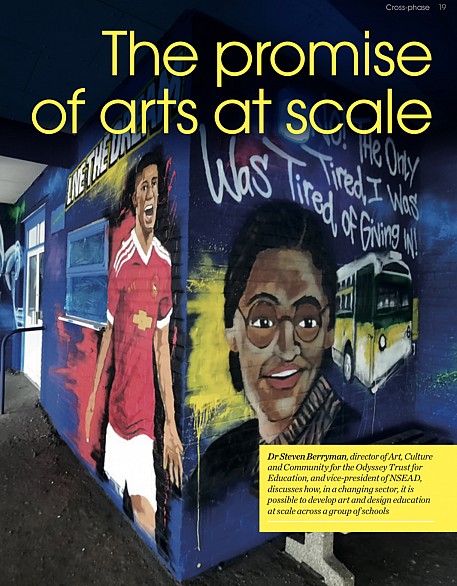
An article exploring arts, culture and creativity across groups of schools and the promise of leading arts at scale in education.
Chapter - Professional Learning book (2022)

Chapter on professional learning networks in Arts education in 'The Power of Professional Learning Networks' edited by Chris Brown and Graham Handscomb.
Interview in Schools Week (May 2022)

Tom from Schools Week interviewed me looking ahead to taking on the President role at the Chartered College of Teaching. You can read the article here.
Cultural Learning Alliance Blog (2022)
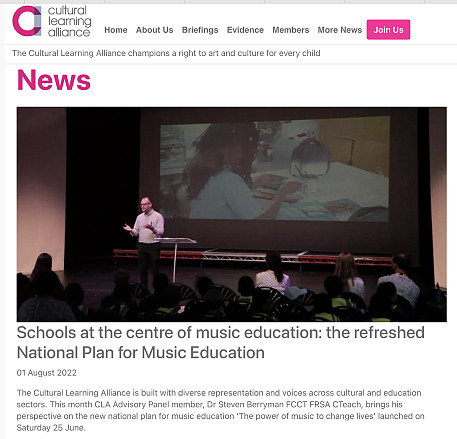
My blog post here for the Cultural Learning Alliance on the refreshed National Plan for Music Education.
NMC Education Resources
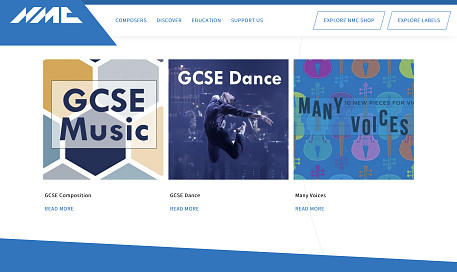
It has been a joy to work with NMC Recordings over a number of years to create education resources; they have a range on their website for music and dance, and my GCSE Composing Resource and Exhibition Project are available freely.
Music Education blog for FED (2022)

You can read the blog post here.
ROH Learning - Create and Sing
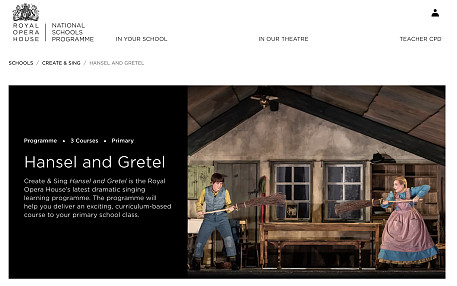
I worked with colleagues at the Royal Opera House to write schemes of work for the Create and Sing project, both Carmen and Hansel and Gretel. All the materials are available freely for schools on the ROH Learning Platform.
Article for Arts Pro (2022)

How the Royal funeral revealed the value of music education.
Partnership blog for FED (2022)

A short blog for FED on partnerships in the arts.
Bridging the Academic-Classroom Divide (Arts Pro, 2021)
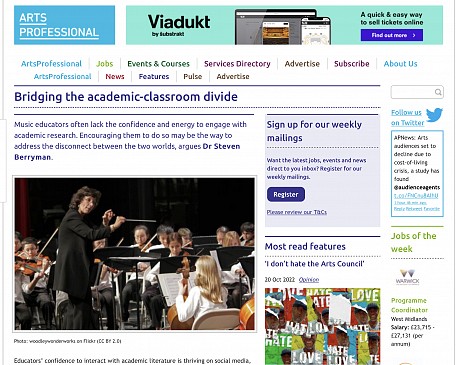
Read here.
Article - Creativity Exchange ACE (2021)

You can read the article exploring creative constraints here, part of the Creativity Exchange website from the Arts Council England.
Article - Wild Search (2021)

A short article for a report from Wild Search on governance and trusteeship, sharing my experiences of governance as an educator.
ResearchHub - Chartered College
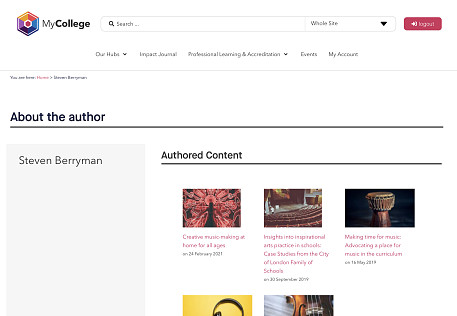
I have written five articles that are now on the Research Hub of the Chartered College of Teaching - these can be accessed here.
TES - Art of conversation (2021)
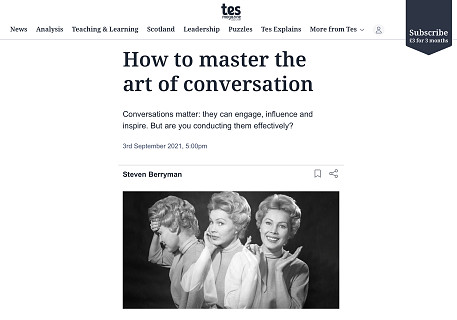
An article exploring the value of meaningful conversations, building on coaching models and questioning. You can read it here.
Article - NSEAD AD Magazine (2021)

Article sharing my experience of learning art and design at school. NSEAD publications can be found here (access to past issues for members).
Guest Editor - MTA Curriculum Special (2021)
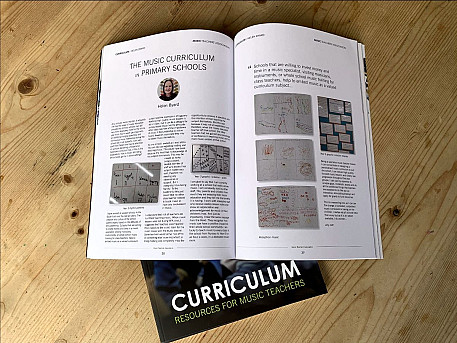
Edited a special issue of the Music Teachers Association magazine Ensemble featuring a selection of curriculum themed articles. Members can access past issues on the members' site.
#CanDoMusic (2021)

A blog following the publication of the Model Music Curriculum in England.
TES on the value of the arts (2020)

Read here a short article on the value of the arts.
Impact special issue on the Arts - Blog (2019)

You can read the post about our celebration event at Southbank Centre for the Arts special issue of Chartered College of Teaching Impact.
Blog for ISC
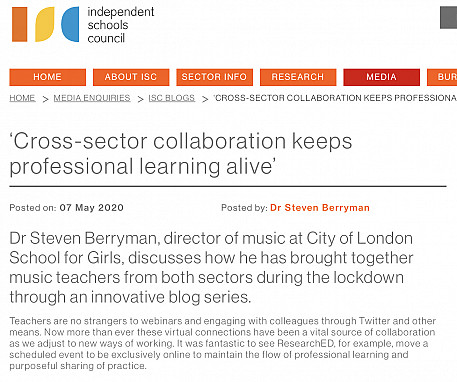
Dr Steven Berryman, director of music at City of London School for Girls, discusses how he has brought together music teachers from both sectors during the lockdown through an innovative blog series.
View ExtractIt was a tweet by Christine Counsell that sparked an idea to connect with music teachers during our current remote working arrangements. Christine highlighted the need for classroom teachers to theorise about curriculum (this was in the context of history teaching), and having worked with trainees from Buckingham University recently I had been using ‘Learning to Teach Music in the Secondary School’ and was ready to make use of the book with more experienced colleagues. I decided to launch a blog series where we would engage with the tasks in the book; a group of class teachers would respond individually and at the end of the day I would combine the responses to make one post to share on social media. I approached a range of colleagues from different contexts, including primary, secondary and independent schools. The response was overwhelmingly positive! We are well past the 10 post mark now and I’m pleased to see other classroom teachers reaching out to join in. Music teachers are often departments of one in schools, particularly in the state sector, and finding the opportunity to connect and chat with colleagues can be difficult. Remote working has given us the chance to make time for these conversations to take place.
Article for Impact (January 2019)

Article for a EdTech special issue of the Chartered College of Teaching's journal, Impact. A reflection on the use of MusicFirst, an online platform for music education.
View ExtractCity of London School for Girls provides students and staff with iPads, and all departments are encouraged to explore how best to integrate the use of mobile technology into the classroom. The music department has adopted the MusicFirst Classroom – an online platform where students can access cloud-based software and create a portfolio of work – to enhance our approach to assessment and extend learning beyond the classroom. This case study will share the benefits and challenges of integrating an online platform with all of Key Stage 3. Drawing on pupil voice, discussions with the founder of the platform and staff that are using it, it will be revealed that there is scope to make effective use of an online platform to fully democratise the learning of music so that all students, regardless of musical skill, can engage with the curriculum.
Guest blog for Music Education UK (January 2019)
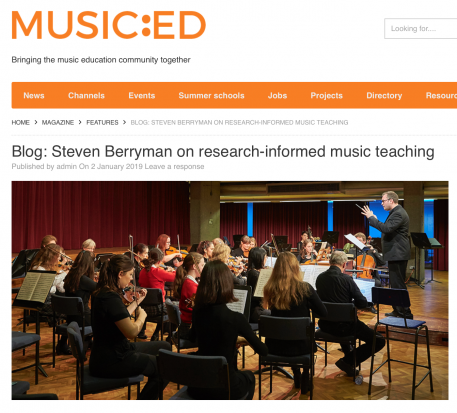
Dr Steven Berryman, Director of Music at City of London School for Girls, calls for more music teachers to engage with research: a vital tool in our work. Being a research-informed teacher is increasingly the norm. Social media allows us to engage with colleagues from across the globe, engage in debate about best practice, share teaching approaches and discover new resources. Social media also allows us to engage with academics and researchers from a variety of disciplines who are keen to investigate aspects of education that can further improve the outcomes for learners.
View ExtractGuest blog for IRIS Connect (January 2019)

Guest blog from Dr Steven Berryman, Director of Music at City of London School for Girls and Visiting Research Fellow at King's College London. Also, Founding Fellow of the Chartered College of Teaching. As a musician, practice is part of daily life. Or I tell my pupils that it is. We practice to maintain our facility at our instrument (or voice), often using exercises to keep certain aspects in good health (such as sound production) because we want our instrumental/vocal skills to be ready when we need them.
View ExtractAs a musician, practice is part of daily life. Or I tell my pupils that it is. We practice to maintain our facility at our instrument (or voice), often using exercises to keep certain aspects in good health (such as sound production) because we want our instrumental/vocal skills to be ready when we need them.
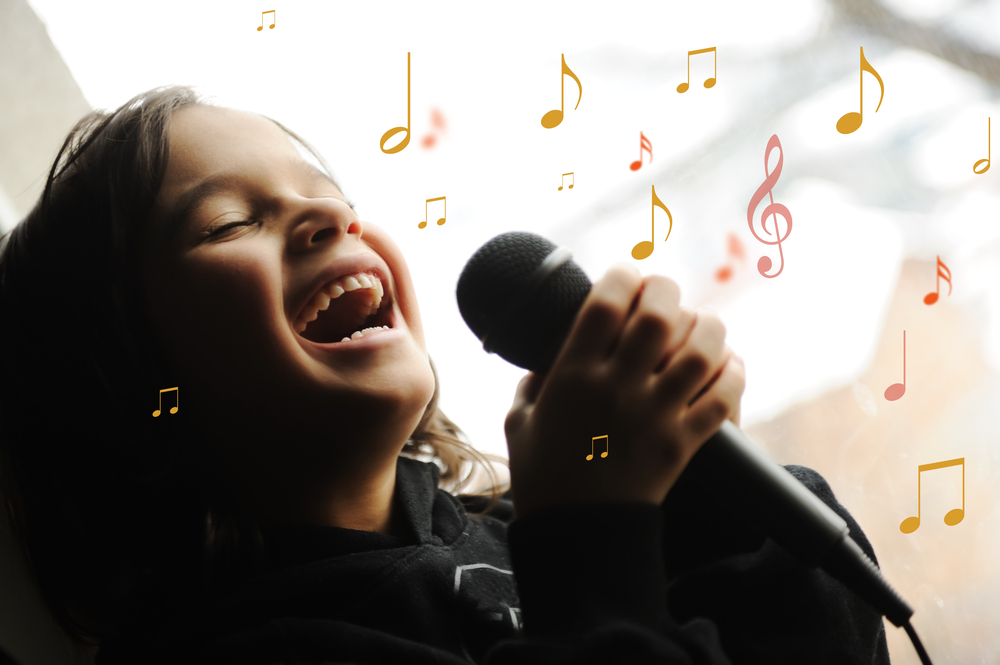
Musicians know all too well how it feels to pick up an instrument (or return to singing) after a break. It feels a bit rusty and then we work harder to get things back to where we need them. The more practice we invest in our playing or singing the quicker things return. Similarly, the longer the gap the bigger the challenge to rekindle our abilities. A previous piano teacher of mine, Kenneth van Barthold, used to say, learning an instrument is like being on an escalator: you either get worse or better but you never stay in the same place.
As a musician I know that practice takes time - I need to repeat things lots - and it takes imagination - in that I need to know what I’m aiming for. We turn up to our music lessons and show the product of our practice. Our teacher listens, offers advice and guidance for the practice we’ll do following the lesson. The cycle continues. Recording is a great tool for capturing practice for review to aid the reflection and modification of playing that will facilitate improvement. I have spent years recording my singing practice and it has been incredibly helpful to guide my practice in the time between lessons.
Writing for Chartered College of Teaching

Blog post and book reviews can be read here.
Article on school music for TES

You can read the article here.
Guest blog for Music Education UK July 2017

A blog post I had written for Music Excellence London has been republished on the new Music Education UK website and can be read here.
View ExtractJoining City of London School for Girls back in September 2015 was an immense joy as I had visited the Barbican hundreds of times since being a student to see concerts, films, dance and exhibitions.
A John Cage weekend during my postgraduate years sticks in my mind as being the best of those experiences. This was my first opportunity to engage with one composer over the course of a weekend and to attend events in different parts of the Barbican Centre. The Musicircus performance in the foyer spaces was the beginning of my collaborative obsession:
'John Cage's Musicircus is simply an invitation to bring together any number of groups of any kind, preferably in a large auditorium, letting them perform simultaneously anything they wish, resulting in an event lasting a few hours. There is no score, no parts, nothing specified except the concept. 'You won't hear anything: you'll hear everything', Cage said.' (Peter Dickinson, writing in The Guardian, June 2014)
There were performers everywhere and I was enthralled by how music brings people together. We collaborate so readily as musicians in performance and my own desire to collaborate came from my composing.
Author for Rhinegold Education

Composition chapters in GCSE Music Study Guides (OCR and Edexcel) 2016.
Pre-Higher Education Creativity
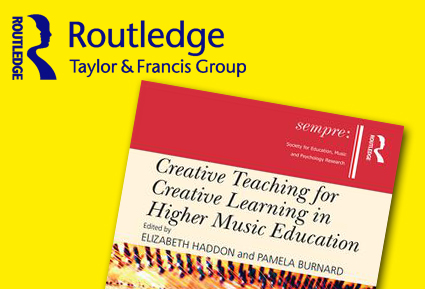
This edited volume explores how selected researchers, students and academics name and frame creative teaching and learning as constructed through the rationalities, practices, relationships, events, objects and systems that are brought to educational sites and developed by learning communities. The concept of creative learning questions the starting-points and opens up the outcomes of curriculum, and this frames creative teaching not only as a process of learning but as an agent of change. Within the book, the various creativities that are valued by different stakeholders teaching and studying in the higher music sector are delineated, and processes and understandings of creative teaching are articulated, both generally in higher music education and specifically through their application within the design of individual modules. This focus makes the text relevant to scholars, researchers and practitioners across many fields of music, including those working in musicology, composition, performance, music education, and music psychology. The book contributes new perspectives on our understanding of the role of creative teaching and learning and processes in creative teaching across the domain of music learning in higher music education sectors.
View ExtractComparative Theory

An article for August 2014 issue of Music Teacher magazine exploring the difference between ABRSM and TCL theory examinations.
Reimagined Recomposed

An article for MusicEd (Asia) including an interview with the pianist Christopher O'Riley and reflecting on how we can reuse pre-existing material to devise new works with students.
View ExtractVoice from the Front
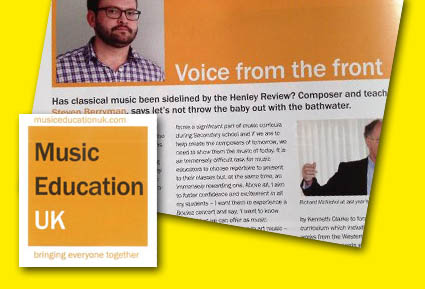
Short article responding to the Henley Review, published in Music Education UK Issue 3, September 2012.
View ExtractDarren Henley's Review of Music Education in England emphasised the value and importance of music-making as a practical skill and how much this can enrich and aid the development of young people's lives. This comprehensive survey lacked a detailed account of class music lessons and accentuated the role of extra-curricular music-making. A music education based on the development of creative and practical skills in music is in no way a bad thing but how important is content in class music lessons and particularly the use of Western art music? Are we offering our pupils a rigorous subject-based curriculum in music or is it just a series of practical activities that develop confidence in singing, playing and composing with a fleeting acknowledgement of the great works of music history? In my view, exploring the great works of the Western art tradition should form an essential part of the music curriculum, balanced with non-classical and non-Western. We should strive to create culturally aware pupils who not only have an understanding of the breadth and depth of 'classical' music but also feel confident in being part of, and perhaps even contributing to, the vibrant classical music scene on offer today.
Music Education UK

Review of Pedro de Alcantara's 'Integrated Practice' (OUP 2011)
View Extract"The Integrated Musician" - Pedro de Alcantara, OUP 2011
There are numerous publications in circulation that provide a wealth of advice on the issue of practising as a musician yet few really grasp the holistic nature of learning an instrument - a synthesis of mind and body - as well as Pedro de Alcantara's recent book exploring coordination, rhythm and sound called 'Integrated Practice'. This makes a welcome addition to writing about the Alexander Technique and the application of its principles to music however this book is a testament to the breadth of the author's experience as a teacher and he draws upon influences beyond the Alexander Technique and music with real aplomb.
The book is organised into three parts starting with rhythm. There is a well paced explanation of prosodic concepts and how they are relevant to music and the chapters in this opening part progress well from basic rhythmic structures to larger 'superbar' structures. Teachers will find lots of activities that will not only be of interest with regards to their own practice but those of their pupils. The author illustrates his ideas with expertly chosen examples and his writing gives one the confidence to apply the concepts to one's own practice. Classroom teachers will find this section interesting for when coaching ensembles and chamber groups as there are ideas here to help improve rhythmic awareness regardless of the genre or style of repertoire.
Ensemble Journal

Piano Professional (EPTA)

Classroom Music Spring 09/10

Classroom Music Summer 09/10
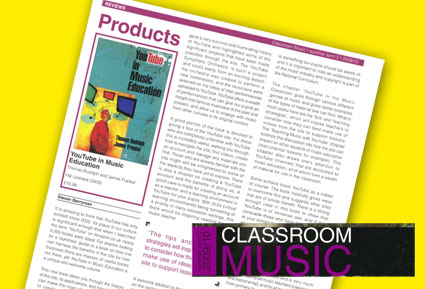
Classroom Music 10/11

Review of 'Sound Foundations'
View ExtractThe composition coursework for GCSE and A-level music can often fill our pupils with excitement, fuelled by the increasingly interesting briefs the examination boards have to offer. Conversely, some pupils are filled with dread. With composing being an essential component of music education right through the early key stages and the examination years, if it is no wonder a wealth of books exist on composing. Recent years have seen resources guided specifically for GCSE and A-level music (including the GCSE Composition Course published by Peters Edition, and those Rhinegold offers) and there are treatises by eminent composers still in print, in addition to articles and books geared towards teachers (the Sounding Symbol by George Odam remains an essential volume).
I was excited to receive Sound Foundations, sub-titled 'a source of reference and a guide for aspiring composers', published in 2009 by Universal Edition. James Rae and Mike Cornick will be familiar names as composers and writers of educational materials, and they have produced a comprehensive volume that aims to do quite a lot in a small space. The book covers the basics of notation, and it is great to see regular examples and suggestions for further listening. This would be ideal for those starting out on composing for the first time, especially as the supporting CD has recorded examples of the musical illustrations (though perhaps some non-sequenced examples would have been welcome).
thomasdeneuville.com 10/11
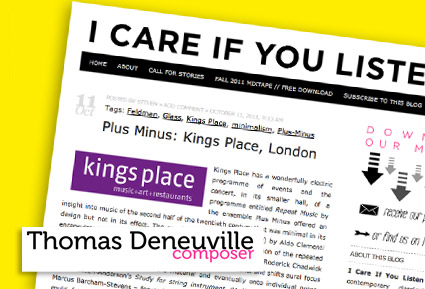 View Extract
View ExtractPiano: Inside/Out - Zubin Kanga @ Kings Place, London
 I always find it interesting to read discussions on the validity of extended techniques and less conventional methods of sound production; perhaps occasionally - and naively - considered to be 'gimmicks', repertoire that exploits a broader pallette of sound production can offer insights not only in the possibilities of writing for particular instruments but also open the audiences' ears to something new. The pianist Zubin Kanga (currently a research student at the Royal Academy of Music, London) gave a brave programme of piano works at Kings Place in February that gave a snapshot of the unending potential this instrument possesses.
I always find it interesting to read discussions on the validity of extended techniques and less conventional methods of sound production; perhaps occasionally - and naively - considered to be 'gimmicks', repertoire that exploits a broader pallette of sound production can offer insights not only in the possibilities of writing for particular instruments but also open the audiences' ears to something new. The pianist Zubin Kanga (currently a research student at the Royal Academy of Music, London) gave a brave programme of piano works at Kings Place in February that gave a snapshot of the unending potential this instrument possesses.
Piano Professional 10/11

"Steven makes his points well and I'm pleased to see that he goes beyond merely advocating a place for classical music in the curriculum. His excellent teaching resources on using the Spectrum piano pieces in the classroom show that he is prepared to look for engaging, worthwhile solutions to this challenge."
David Ashworth
Project Leader for Teachingmusic.org.uk
Using Spectrum in teaching composition
Nothing can be more satisfying in the early stages of a new composition with a pupil than exploring scores. For me, all composition should start with research; listening to similarly scored pieces, exploring a particular composer in depth and perhaps even researching a particular compositional technique as adopted by a group of composers. Thalia Myers' wonderful Spectrum series unendingly surprises me with such a wealth of compositional intrigue; her carefully selected volumes offer such breadth of compositional approach that regardless of the composition a pupil is working on (or even writing myself) one can perceive with immediacy a mass of inspiration. If you are a teacher who is regularly asked by pupils to help with the dreaded GCSE and A level composition coursework, or to offer much needed inspiration to those who find composing a challenging task, you will find a great deal on offer in all of the piano volumes in Spectrum series to spark off even the most struggling young composer.
All the pieces in the series offer a glimpse of a composer's approach encapsulated in microcosm. Each piece offers a potential starting point, or an approach that could be adopted by a pupil in much need of inspiration. The first Spectrum volume for example has a wonderfully evocative short piece by Philip Cashian, 'Landscape'. This piece can be used to demonstrate a work that is structured by timbre and density, through a colourful harmonic approach. It would be advantageous to play this to a pupil and let them perceive the structure of the work - modelling how a piece need not be structured through the repetition of melodic ideas but through the careful gradation of harmonic and textural density. There is a real sense that the harmonies were discovered by Cashian through experimentation on the piano, and in turn pupils can be encouraged to find interesting combinations of notes on the piano free of the restrictions of triads. Fitkin's 'Sazz' further shows how through extension of triads and the juxtaposition of seemingly unrelated triads one can create a beautifully expressive miniature.
thomasdeneuville.com 10/11

